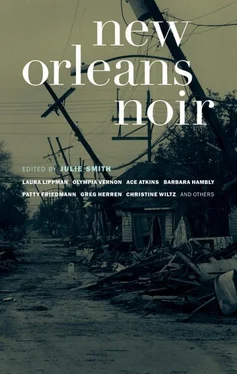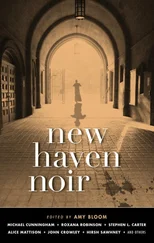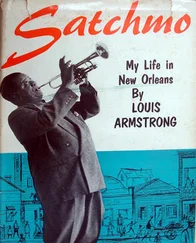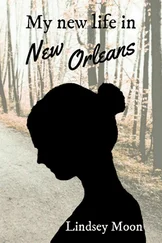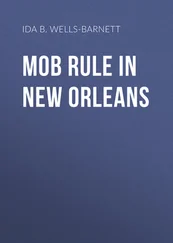The day after commencement at Loyola, I marched down to the Orleans Parish District Attorney’s Office with my law degree and got myself hired. I could just as easily have taken a job as a public defender. Frank never said anything about my spiteful choice, but I know I hurt him.
The white man who hired me at the D.A.’s office soon thereafter prosecuted my brother and sent him up to Angola, where they eventually put him down like a cat for stealing Miss Malreaux’s money and afterwards splitting her head open with an axe.
Even though the crime scene investigators never found that axe and had to rely on the coroner’s analysis at trial, the prosecution case against Frank was sufficiently solid. More solid, I admit, than a lot of cases I have prosecuted myself. People go to prison and get the needle for pitifully little evidence, really. All colors of people.
Frank had long been working handyman jobs at the big Malreaux house — earning money for my tuition at Loyola University School of Law, no less. So Frank had access to the place. The forensics squad came up with a smudged thumbprint they claimed was Frank’s, right there on the dial of a private safe in the brick shed where Miss Eugenia was known to keep large amounts of cash. Add to that, investigators found a considerable number of Miss Eugenia’s jewelry items inside a chifforobe drawer in the pink house.
They didn’t find the looted cash, though. Frank, of course, denied stealing money or jewelry from Miss Eugenia, just like he denied stealing anything else in his life. He’d wear that bad-dog look on his face when confronted on matters of theft, which was as close as he’d come to admitting his light-fingered predilection — until his last letter, that is.
Certainly he denied murdering Miss Eugenia. Which flew in the face of jewelry found in the chifforobe. Which Frank’s court-appointed lawyer might have said flew in the face of common logic, therefore constituting reasonable doubt in the mind of a juror. Because why would a murderer keep mementoes of his victim in the same place he kept his socks and boxer shorts?
At first, I thought it would be no problem to chainsaw the bedroom suit. Maybe in the past it was all worth some serious antique money. But the value was surely gone now — now that all that cherry wood was so nasty and swollen and probably full of termites, too. It was junk and nothing more. No problem.
But there I was in my dead brother’s house, in the room where he used to sleep as a free man. Sentiment hammered me. The rented chainsaw seemed as disrespectful to Frank’s house as Mother Nature had been.
Speaking of a hellish vandal woman, I took a long moment to gaze around the bedroom after a knock-down drag-out with Katrina.
Schaefer Skrip bottles by the dozen had flown around like stones in the hurricane, smashing into walls where splattered ink adhered to glass shards and blue and yellow labels. The floor was a carpet of Budweiser cans, crushed the way Frank crushed them with his big right hand, sodden Camel butts and moldy paperback books with underlined pages. Crime novels mostly. The door to the hallway was cracked in two and the plaster ceiling had gone pulpy like ricotta cheese.
Then I read the next parts of Frank’s last letter.
Evil and lowdown ain’t my view alone of Miss Eugenia Malreaux. It’s what the old bag son Philip call her. He told me things about his mama make you toss a meal. Told me when he was just a boy she’d come wake him up in his bedroom some nights wearing nothing but a peek-a-boo and she poke where she ain’t got bizness poking. Philip tell on her to his daddy one day. Then soon as daddy leave the house that lowdown Miss Eugenia take a strap to Philip and nearly skin him alive.
Oh yes, Philip he told me lots of things about the grand life up on St. Charles Avenue where it all look peace and quiet respectable. He said he like it better where we live in Gentilly on account of pain and awfulness can’t be hid away so easy.
Also Philip said he like talking to me whenever I come by to work for his mama in the garden since I understand the two of us is in the same boat — a couple of mens waiting around for the rest of their life to happen. Philip, he couldn’t get enough of that sad sack talk and start coming by to drink with me at the Star Lounge, my little briar patch by good old St. Bernard.
I always feel sorry for Philip when he come slumming, a puffy little white guy in there with us Negroes. But I don’t feel sorry enough to forget about asking him where do they hide the money up to his place on St. Charles. And he told me. Told me his mama keep a wall safe in the very last place I’d ever think to look, which is the garden shed behind the tools.
Also, he told me how he steal money from the evil lowdown old bag first as a boy, then as a grown man when he hide it down to the bank on Poydras Street where he keep a safety box in the vault on account of he trusts banks even if his mama don’t...
Because Frank had secured them so carefully in a false compartment he’d constructed in the back of the chifforobe, the only thing in the room that wasn’t ruined by greasy water were the Big Chief pages of his long letter. Oh — and the money, which made me nervous on many levels and which trembled my hands to the point where I couldn’t help but spill the cash over the muck of cans and butts.
What especially unnerved me was my own larcenous first impulse on seeing all that green: how I’d spend it on my own selfish self, or at least pay off my bills. Which is not the way a sworn man of the law such as I am, after all, is supposed to think. The first thing I am obliged to do under the circumstances of tainted money is turn it in lickety-split, along with anything else incriminating, such as Frank’s letter of a singular confession to theft in this particular instance.
But somehow I knew I wasn’t going to feel so obliged. Maybe this was because of the crappy trial that Frank endured; not quietly, as they often tied him down on the defendant’s chair and stuffed a bailiff’s hanky in his mouth when he cursed the judge too much. Maybe it was because of my own rage that I had to keep bottled up since I myself am part of the crappy system, prosecution side. Maybe it was because of the parade of incompetent drunkards Frank kept hiring, since that’s all he personally knew of the city’s criminal defense bar and refused to consult me on the matter of his defense.
“Sorry, my Wussy Wally, but I ain’t about to trust nobody who work for the Man going to get me needled for a lawyer reference — not even my own brother.” Frank had told me this on the one occasion he agreed to see me in his cell.
Or maybe I was feeling rebellious against the whole crappy system, because once again Aunt-tee Viola spoke for the whole bunch of my cold relations when she came on the bus to the D.A.’s office on South White Street, right in the middle of my brother’s highly publicized axe-murder trial, for an approving look-see. She told me, “Walter, we’re so proud of you for rising above your brother’s miserable failure of a life.” I bottled up what I thought right then: In my brother’s case, the words South and white were not harbingers of justice.
No doubt I was seriously conflicted because of my guilt for spiting Frank. It was a guilt settled in for life after I read through the transcript of his trial in the Superior Criminal Court of New Orleans, especially the part I can’t help but remember by heart:
Mr. Masson : I want another attorney.
The Court : Well, I don’t think I’m going to do that.
Mr. Masson : Y’all go ahead and have your trial if you want, but leave me out of it. You can sentence me, hang me, stick a needle to me, do what you want. If you don’t give me no other lawyer, I ain’t taking part in this stupidity. I already told you I didn’t steal no money and I didn’t bash the brains out of no white lady. Go on now, have court without me. I don’t care.
Читать дальше
